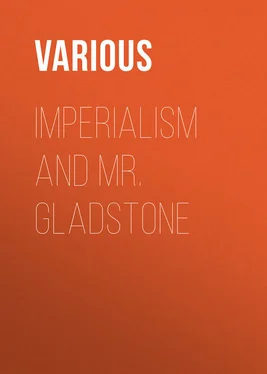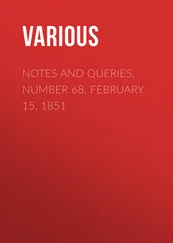Various - Imperialism and Mr. Gladstone
Здесь есть возможность читать онлайн «Various - Imperialism and Mr. Gladstone» — ознакомительный отрывок электронной книги совершенно бесплатно, а после прочтения отрывка купить полную версию. В некоторых случаях можно слушать аудио, скачать через торрент в формате fb2 и присутствует краткое содержание. Жанр: История, foreign_edu, на английском языке. Описание произведения, (предисловие) а так же отзывы посетителей доступны на портале библиотеки ЛибКат.
- Название:Imperialism and Mr. Gladstone
- Автор:
- Жанр:
- Год:неизвестен
- ISBN:нет данных
- Рейтинг книги:4 / 5. Голосов: 1
-
Избранное:Добавить в избранное
- Отзывы:
-
Ваша оценка:
- 80
- 1
- 2
- 3
- 4
- 5
Imperialism and Mr. Gladstone: краткое содержание, описание и аннотация
Предлагаем к чтению аннотацию, описание, краткое содержание или предисловие (зависит от того, что написал сам автор книги «Imperialism and Mr. Gladstone»). Если вы не нашли необходимую информацию о книге — напишите в комментариях, мы постараемся отыскать её.
Imperialism and Mr. Gladstone — читать онлайн ознакомительный отрывок
Ниже представлен текст книги, разбитый по страницам. Система сохранения места последней прочитанной страницы, позволяет с удобством читать онлайн бесплатно книгу «Imperialism and Mr. Gladstone», без необходимости каждый раз заново искать на чём Вы остановились. Поставьте закладку, и сможете в любой момент перейти на страницу, на которой закончили чтение.
Интервал:
Закладка:
Within a short time after Osman's surrender at the bridge over the Vid, on the Sofia road, the 16,000 prisoners were turned back into the town, with the artillery and transport trains… The Turks were well fed in appearance, but were generally ragged, and were all wearing sandals. No boots were to be seen, though most of them had overcoats… The contrast between these tatterdemalion battalions and the well-dressed men guarding them made the war appear a one-sided affair, until the reflection came that a ragged man shot as well as one perfectly equipped. Later in the day, standing on the Sofia road, in the Gravitza valley west of Plevna, I surveyed the whole basin forming Osman's position. The herbage and all other growing things had so effectually disappeared that the earth's surface looked as if a conflagration had swept over every square foot of it. The colour was a dull brown, and I never gazed upon a more dismal-looking region. The sides of the basin were serried by ravines, all centering in the valley where I stood, and upon the surrounding edges of the basin were the Turkish and Allied batteries planted in irregular line, but commanding every vantage-point of the neighbourhood… Where the Gravitza chaussée crosses the elevation the Turkish redoubts were weakest, and here the Russian artillery fire had been chiefly concentrated. The front and rear of the earthworks were ploughed up by shells, and in truth there was scarcely a square yard which had not been struck. Thousands of such missiles, varying from 3 inches to 6 inches in diameter, lay unexploded upon the surface of the earth. In a previous telegram I said that these redoubts were battered to pieces; but I now discover that this was a curious error of vision. The works are practically uninjured. So far as the earthworks are concerned, the Russian artillery ammunition has been absolutely wasted, and from an inspection of the trenches I do not believe that the garrison has suffered more than their defences. Neither do I believe that any artillery could have accomplished more. The fact is that shells against earthworks are useless at a greater distance than 500 or 600 yards, and then the guns cannot be worked on account of the enemy's sharpshooters. The Turkish soldiers in the redoubts had bomb-proof abodes in the back walls of the pits… I was very much surprised to find the Turkish lines of fortification so weak, as far as the quantity of earthwork is concerned. The redoubts are much smaller than I supposed them to be… There are no double lines of infantry trenches – in fact, no interior lines of any sort; neither are there trenches on the hillsides below the redoubts. There are no lines of intrenchments for the reserves; indeed, there were apparently no reserves. When I saw this technically weak line I could not but admire the efficiency of the weapons with which it had been defended, and the stubborn tenacity of the men who could hold it against such assaults as the Allies have delivered against it. The Allies had double and treble lines around Plevna. Their works are much better constructed than those of the Turks, so far as finish is concerned; but for safety I would rather trust myself to the latter… The Roumanian trenches, however, were well constructed and capacious. The best trench is within 25 feet of the Turkish counterscarp [of a redoubt]. From the bottom of this trench two shafts were sunk about 15 feet in depth, and from the bottom two galleries had been pushed under the Turkish parapet, and the mines were nearly ready when the Moslems evacuated their positions. But the strangest part of the history of this siege is the fact that the Turks had also mined the Gravitza redoubt opposite, and before leaving their earthwork they had fired the mining fuse. The Roumanians, discovering their departure, entered their ditches, found the gallery, and reached the fuse in time to quench it before it had burned to the explosive charge; so that each was prepared to blow the other up without knowing, apparently, that counter-operations were in progress…
At noon to-day the Emperor arrived at the redoubt defending the approach to Plevna by the Gravitza chaussée … [After a religious service] the whole party rode into Plevna, taking the less frequented streets, lest some assassin might fire upon the Emperor. In a small house, surrounded by a high stone wall, lunch was served, after which there was a sudden hush, and Osman Pasha was carried into the yard and through the portico by a Cossack officer and one of his own attendants. As he passed through the crowd of staff officers, every one saluted him, and shouted, "Bravo, Osman!" He then passed into the presence of the Emperor, who shook hands with him, and informed him that, in consideration of his gallant defence of Plevna, he had given orders that his sword should be returned to him, and that he could wear it.
STRAINED RELATIONS WITH RUSSIA (1878)
I
The Chancellor of the Exchequer: Mr. Speaker, the Government have received a telegram to-day from Mr. Layard, containing a summary of the articles of the armistice… The telegram ends by saying that the Turks have begun to remove their guns from the Constantinople lines. Now it is quite evident that, whatever may have been the arrangements with regard to the neighbourhood of Constantinople, a neutral zone has been declared, which includes the lines of Tchekmedje, which protect Constantinople; and according to the terms of the armistice the Turks are bound not to retain those fortresses, and accordingly are bound to remove – and are quietly beginning to remove – their guns and armaments from the fortifications by lines and to specified places… The consequence is that, although the Russians do not occupy those lines themselves, they occupy an outpost close to them, while the lines themselves are being thoroughly disarmed. They have the power, therefore, at any moment, subject to the necessity of giving three days' notice of the termination of the armistice, of advancing on Constantinople without hindrance… I may perhaps venture to call the attention of the House to one of the papers which we laid upon the table yesterday. That contains a copy of a Memorandum which was communicated to the Russian Ambassador by Her Majesty's Government on the 28th of July last, in which they say they "look with much anxiety at the state of things in Constantinople, and the prospect of the disorder and bloodshed, and even anarchy, which may occur as the Russian forces draw near to the capital. The crisis which may at any time arrive in Constantinople may be such as Her Majesty's Government could not overlook, while they had the means of mitigating its horrors. Her Majesty's Government are fully determined (unless it should be necessary for the preservation of interests which they have already stated they are bound to maintain) not to depart from the line of neutrality which they have declared their intention to observe; but they do not consider that they would be departing from this neutrality, and they think that Russia will not consider they are doing so, if they should find themselves compelled to direct their fleet to proceed to Constantinople, and thus afford protection to the European population against internal disturbance." The Government, I may add, feel that the state of affairs disclosed by the armistice has given rise to the danger which they thus apprehended, and they have, in the circumstances, thought it right to order a portion of the fleet to proceed at once to Constantinople for the purpose of protecting the lives and property of British subjects.
The Chancellor of the Exchequer: I stated, I think, or at all events referred on Monday to the fact, that communications had been made to the Porte to ascertain whether permission would be given, or a firman be granted, for the British fleet to enter the Dardanelles. That permission was refused, but Her Majesty's Government thought it right to direct the ships to proceed, and they have proceeded accordingly. No material opposition was offered, and they are by this time, I presume, anchored in the neighbourhood of Constantinople. I may perhaps mention that a communication has been made by the Russian Government to the effect that, in view of the intended sending of the fleet by Her Majesty's Government to the neighbourhood of Constantinople, it would be a matter for the consideration of the Russian Government whether they should not themselves occupy the city. In answer to that Her Majesty's Government have sent a communication which will be laid on the table of the House to-night, in which they protest against that view, and state that they cannot acknowledge that in the case of the two countries the circumstances are parallel, or that the despatch of the British fleet for the purpose indicated justifies the Russian Government in the step which they announce it to be their intention to take.
Читать дальшеИнтервал:
Закладка:
Похожие книги на «Imperialism and Mr. Gladstone»
Представляем Вашему вниманию похожие книги на «Imperialism and Mr. Gladstone» списком для выбора. Мы отобрали схожую по названию и смыслу литературу в надежде предоставить читателям больше вариантов отыскать новые, интересные, ещё непрочитанные произведения.
Обсуждение, отзывы о книге «Imperialism and Mr. Gladstone» и просто собственные мнения читателей. Оставьте ваши комментарии, напишите, что Вы думаете о произведении, его смысле или главных героях. Укажите что конкретно понравилось, а что нет, и почему Вы так считаете.












